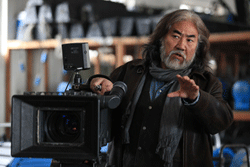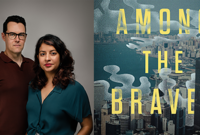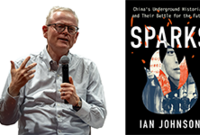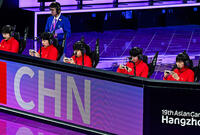The first UCLA-USC joint Media and Culture in Contemporary Conference featured one of China’s most acclaimed directors and producers, Zhang Jizhong. Scholars and industry professionals in film and media studies gathered on both UCLA and USC campuses on October 21 and October 22 for the two-day conference that explored the globalization of the China entertainment industry and the impact of television and film on public perception of history and culture in China. The two-conference was moderated by Martin Kaplan, the founding director of USC’s Norman Lear Center.
Zhang Jizhong served as the keynote speaker of the conference and spoke on his personal experiences and challenges with Chinese media. In an interview with US-China Institute’s Asia Pacific Arts, Zhang talked about his various inspirations for his productions and his current film with Hollywood on the Monkey King.
The two-day conference featured multiple conference panels that examined the state of the film and television in contemporary China; the recreation of history and classic literature through film; and the globalization of theme parks. The second day of the conference was a question-and-answer session with Zhang on developing the Monkey King theme park, which is expected to be completed in the next three to five years.
Conference planners are UCLA Asia Institute Director R. Bin Wong; UCLA history professor Andrea S. Goldman; UCLA Asian Languages and Cultures department chair David Schaberg; USC East Asian Studies Center director Stanley Rosen; and USC Annenberg Norman Lear Center director Martin Kaplan. Additional support comes from the UCLA Confucius Institute and the UCLA-USC Joint East Asian Studies Center, with funds from the US Department of Education Title VI program. Other partners include the History Department, the Humanities Division, and the International Institute at UCLA and the USC US-China Institute.
The conference is sponsored by the USC-UCLA Joint East Asian Studies Center, with funds from the U.S. Department of Education. Other sponsors include the Confucius Institute, the History Department, the Humanities Division, and the International Institute at UCLA and the USC US-China Institute. The USC Annenberg Norman Lear Center is another partner.
Session 1: The State of the Film & Television Industry in Contemporary China: The View from the Academy
Chair: Stanley Rosen, Political Science, USC
Michael Berry, East Asian Languages & Cultures, UCSB, China's Hollywoods: Global Chinese Cinema in the Postsocialist Era
Aynne Kokas, Asian Languages & Cultures, UCLA, Imaginary Landscapes, Imagined Communities
Sun Shaoyi, Shanghai University/NYU in Shanghai, It's Safe to Laugh Now: The Comic Turn of Contemporary Chinese Cinema
Michael Curtin, Film & Media Studies, UCSB, Big Media, Soft Power: The Possibilities and Perils of State Leadership
Discussant: Robert Rosen, School of Theater, Film & Television, UCLA
Session 2: The State of the Film & Television Industry in Contemporary China: The View from the Industry
Moderator: Martin Kaplan, Director, Norman Lear Center, USC Annenberg School
Mike Medavoy, chairman and CEO, Phoenix Pictures, and co-founder of Orion Pictures
William M. Mechanic, president and CEO of Pandemonium Films, and former chairman and CEO of Fox Filmed Entertainment
Janet Yang, president of Manifest Films, and former president of production of Oliver Stone’s Ixtlan Productions
Teddy Zee, president, Teddy Zee Productions, and former senior production executive at Paramount and Columbia
Peter Shiao, founder and CEO, Orb Media Group
Session 3: Recreating Chinese History and Classic Literature in Film & Television
Chair: Andrea S. Goldman, History, UCLA
Jonathan Chris Hamm, Asian Languages & Cultures, University of Washington, From the Boxers to Kung Fu Panda: The Chinese Martial Arts in Global Entertainment
Zhu Ying, Media Studies, College of Staten Island, CUNY, From Anticorruption to Officialdom: The Transformation of Chinese Dynasty TV Drama
Rong Cai, Asian Languages & Cultures, Emory, Memory of Politics and Politics of Memory: Restaging Revolution on Contemporary Chinese Television
Matthias Niedenführ, Director, European Centre for Chinese Studies, Revising and Televising the Past: Portrayal of Historical Leader Figures in Chinese TV Dramas
Discussant: Robert Chi, Asian Languages & Cultures, UCLA
Session 4: Globalization of Theme Parks: the View from the Industry
Moderator: R. Bin Wong, History & Director, Asia Institute
Zhang Jizhong, TV & film producer; Monkey King theme park creator;
Bob Weis, Executive Vice President, Walt Disney Imagineering;
Brent Young, Principle & Creative Director, Super 78 Studios.;
Shi Zhang, Assoc. Professor, UCLA Anderson School of Management;
Thomas E. McLain, Partner, Arnold & Porter LLP and Chairman of the Asia Society of Southern California
Session 5: Theme Parks in China: the View from the Academy
Chair: David C. Kang, Interim Director, East Asian Studies Center
Hai Ren, East Asian Languages, University of Arizona, "Leisure as an Event of Self-Formation at a Chinese Theme Park";
Susan Brownell, Anthropology, University of Missouri-St. Louis, "World Expo Shanghai 2010: Why it wasn't a media event, but still drew 70 million spectators"; Sun Shaojing, School of Journalism, Fudan University, "Experiencing cultures: Chinese visitors' encounter with nation-brands at Shanghai Expo."
Discussant: Yunxiang Yan, Anthropology & Director, Center for Chinese Studies, UCLA




